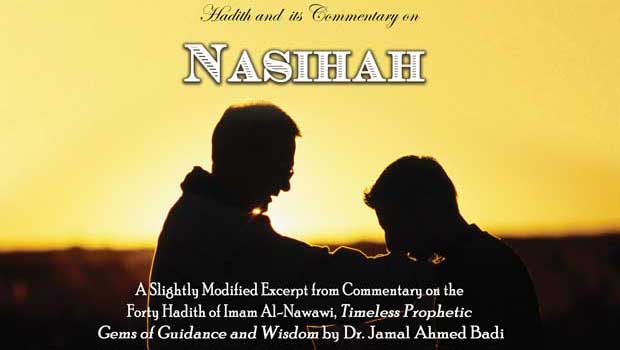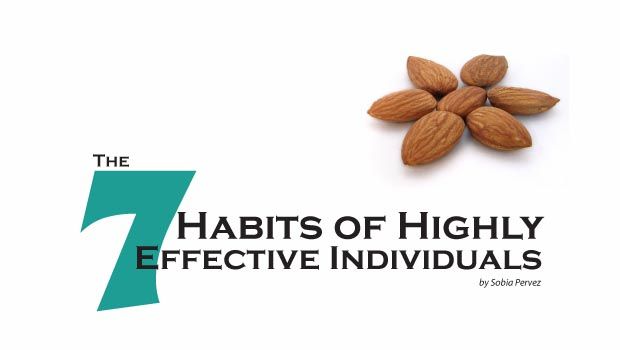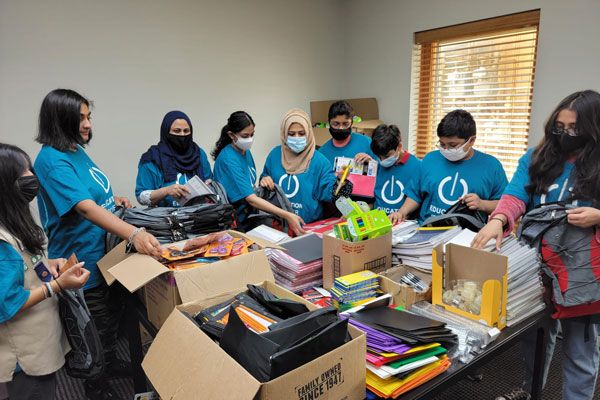We often misconceive the nature of this dunya. The reality is that it is made up of good moments intermixed with suffering. This dunya does not consist of exclusively sad or happy moments. Pure happiness is in Paradise and pure sadness is in Hell. So, each painful time surely will pass. Giving vent to our rage or grumbling about our misfortune will not change the reality! It will only result in losing both the dunya and the Hereafter. Glory be to Allah! This life goes by as quickly as “the blink of an eye.” If we take a long-range view including both the dunya and the hereafter, any bad occurrences make up only a small part of it.
Live in the Dunya as a Traveler
We have to remember that our fitra is designed so that we yearn for our creator. It seems as if there is a hole in our hearts that needs to be filled. It cannot be left empty. All through life, people are seeking to fill that void. Some people make their hearts feel whole with the love of Allah. Others seek fulfillment in their careers, fame, relationships, etc. It is very dangerous to let worldly pleasures, which are temporary, creep into our hearts which are made for what is eternal, unending, and perfect. This explains why some people crumble and cannot go on when they are deprived of temporary attachments. We bring about our own destruction when we store worldly pleasures in the wrong place. They should have been kept in our hands. The Prophet’s companions (may Allah be pleased with them) used to ask Allah to enable them to keep the worldly pleasures in their hands, not in their hearts. In fact, people who let their love of Allah lodge in, and shine through, their hearts are able to navigate safely through this life. Whoever submits to Allah, this dunya will definitely submit to him in return.
It is so important to understand that this dunya is temporary. Allah has created it as a means for achieving the Hereafter. So, we should not confuse the means with the end. In this dunya, we are provided with many resources and gifts to be able to achieve our purpose. Yet, we become so engrossed with Allah’s gifts that we do not look beyond them. It is as if a king sent you a message and you were so enamored with its elegant seal that you did not read what was written inside. Allah, The Merciful, warns us of being too attached to dunya, and He also gives us the proper perspective. He directs us to live in this dunya as “a traveler” or “a stranger.” If someone is traveling to a foreign country, will he carry everything he owns with him? Certainly, he will bring with him what enables him to fulfill his purpose, but nothing beyond that.
This mindset is what we need to make our way through this dunya. We get into trouble when we try to mold dunya into something that it is not. Allah SWT says, “O my people, this worldly life is only [temporary] enjoyment, and indeed, the Hereafter — that is the home of [permanent] settlement” (Quran, 40:39). This is not a call to forsake dunya altogether, but to be mindful of its purpose. Prophet Muhammed (pbuh) teaches his ummah how to strike a balance between dunya and striving for the Hereafter. He said, “By Allah, I fear Allah more than you do, and I am the most obedient and dutiful, among you, to Him, but still I observe fast and break it; perform salat and sleep at night and take wives. So, whoever turns away from my sunnah does not belong to me” (Bukhari and Muslim).
Since this dunya is temporary, it at times delights us and at other times burdens our hearts. Allah SWT says, “And We will surely test you with something of fear and hunger and a loss of wealth and lives and fruits; but give good tidings to the patient…” (Quran, 2:155). Everyone in this life faces tribulations one way or another. Allah SWT says, “Do the people think that they will be left to say, ’We believe’ and they will not be tested?” (Quran, 29:2). When Allah strikes the believer with calamities, this does not mean that He wants to punish him. He is testing his faith. The Quran tells us, “Allah does not burden a soul more than its capacity” (2:286). However, there may be some kind of hardships caused by the person himself. For example, if someone drives his car very fast and gets himself into an accident, this disaster is of his own making. Allah SWT says, “And whatever strikes you of disaster, it is for what your hands have earned; but He pardons much” (42:30).
Testing May Be by Blessings or Difficulties
We also have to remember, in order to best deal with trials and tribulations, that testing may be either by blessings or difficulties. When showered by Allah’s blessings, we have to show gratefulness. Similarly, if afflictions have befallen us, we should show forbearance. The Messenger of Allah (pbuh) said, “How wonderful is the case of a believer; there is good for him in everything and this applies only to a believer. If prosperity attends him, he expresses gratitude to Allah and that is good for him; and if adversity befalls him, he endures it patiently and that is better for him” (Muslim). Thus, whether we are experiencing blessings or tribulations, we are being tested: “And We test you with evil and with good as trial” (Quran, 21:35).
The Response to Hardships Is the Key
Hardships, in fact, can be either negative or positive depending on the believer’s response to them. They become a blessing in disguise when they bring the believer closer to Allah. On the other hand, they become negative for the believer if he or she allows the hardship to form a barrier between them and Allah. Imam Abi Hamid al-Ghazali asserts that the toughest kind of hardship is that in which the believer has no hand, such as death, sickness, etc. That’s because he knows neither the wisdom behind his misfortune, nor when it is going to be alleviated. In these types of calamities, the believer witnesses Allah, The Irresistible. The wisest choice, then, is turn to Him in surrender. These afflictions, indeed, intend to make us run to Allah rather than away from Him. Glory be to Allah — “There is neither fleeing from You nor refuge but with You” (Sahih Bukhari). Prophet Muhammed (pbuh) used to pray, “[O Allah] make it easy for us to bear the calamities of this world” (Tirmidhi).
Ibn Abbas (may Allah be pleased with him) said, “In every tribulation there are three blessings: first, it could have been worse than what it is. Second, the tribulation is in your worldly affairs and not in your deen. Third, the tribulation is in this world and not in the Hereafter.” Moreover, when we maintain our surrender and gratitude to Allah SWT while dealing with a hardship, we are in a state of worship as we are waiting for relief to come. Prophet Muhammed (pbuh) said, “Ask Allah of His Bounty. For verily, Allah the Mighty and Sublime loves to be asked, and the best of worship is awaiting relief” (Tirmidhi).
Allah SWT says, “And We will surely give those who were patient their reward according to the best of what they used to do” (Quran, 16:69). Allah asserts that He is with those who are patient. And He will descend on them His peace and blessing and will guide them through their difficult times. There is a hadith in Sahih Muslim that reports that one dip in the bliss of Paradise will make the person forget all about his sufferings in this dunya. Likewise, the happiness a person derives from worldly pleasures will disappear by only one dip in the Hellfire. Imam Abi Hamid al-Ghazali points out that patience is the only kind of worship that Allah has promised to reward without limit. Imam also stresses that blessings in life aim at making us yearn for Paradise. And any emotional or physical pain is intended to frighten us of the Hellfire.
Actually, accepting the qadar (destiny), whether bad or good, is the sixth pillar of our religion. Allah criticizes those who bewail their lot and turn away from Him: “And of the people is he who worships Allah on the border-line. If he is touched by good, he is reassured by it; but if he is struck by trial, he turns on his face. He has lost the dunya and the Hereafter. That is a manifest loss” (Quran, 22:11). Yet, whoever has fallen because of his weakness, he has the chance to rise up again and seek forgiveness. As long as there is tomorrow, there is hope.
Prayer Empowers Us
We sometimes misunderstand the function of praying. Praying, in some cases, changes the reality; but in most cases, it is us who must make the effort to change circumstances or situations. Be it losing your beloved to death, or being deprived of your career or wealth, the function of praying is to empower you to overcome those hardships. Praying will not bring your beloved back to life, nor will it restore your career or wealth overnight. It will rather make your heart heal and enable you to get back on your feet once again. It will give you the strength to rise up and move on. If we go back to Islamic history, we see how the Prophet and his companions greatly suffered in the process of spreading the message of Islam. They were persecuted for many years until such time that Allah destined His message to prevail. The same applies to us today — with what devotion do we endeavor in Allah’s cause? The fact is that today we live in a fast-changing world and too often we expect our prayers to be answered in a matter of seconds and in the form we want. Indeed, this materialistic world has taken its toll on us, making it easy to forget that the spiritual reality requires from us patience, perseverance, endurance, and willingness to delay gratification.
Allah Will Smooth Our Way to Ease
Finally, Allah stresses that relief comes with hardships. “For indeed, with hardship there is ease.” (Quran, 94:5). Some understand this verse as meaning that every hardship in this life will ultimately end and relief will come in this dunya. That is true in some cases, but not all. For example, a person might battle cancer for five years and suffer continuously and then die. Many people have very hard lives in which it seems their suffering never ends. In those cases, the meaning of the verse might be that ease, or relief, is available to the believer, despite the suffering. Along these lines, Allah SWT tells the Prophet (pbuh), and by extension, all believers, “And We will smooth your way to perfect ease” (Quran, 87:8).
The same idea about “ease” is repeated in 92:5-10. In those verses, Allah tells us that the one who gives in charity, has taqwa, and believes in goodness, that Allah will make the path to ease smooth for him. The point is that when we surrender to Allah SWT and when we understand the nature of this dunya, we find a peace and a calm that transcends everything, including pain and suffering. When we accept that this is a life of trials and tribulations, when we really get it that everything can be a means to demonstrate our faith, to deepen our love and fear of Allah, then we find relief and ease within even the greatest hardship. It is a relief and ease of mind and heart yielded out of eman, molded with hands of devotion, and purified of all that debases. For it is His Presence, felt in the depths of one’s soul, that opens the doorway and leads from suffering to ease and brings relief to a burdened heart.





